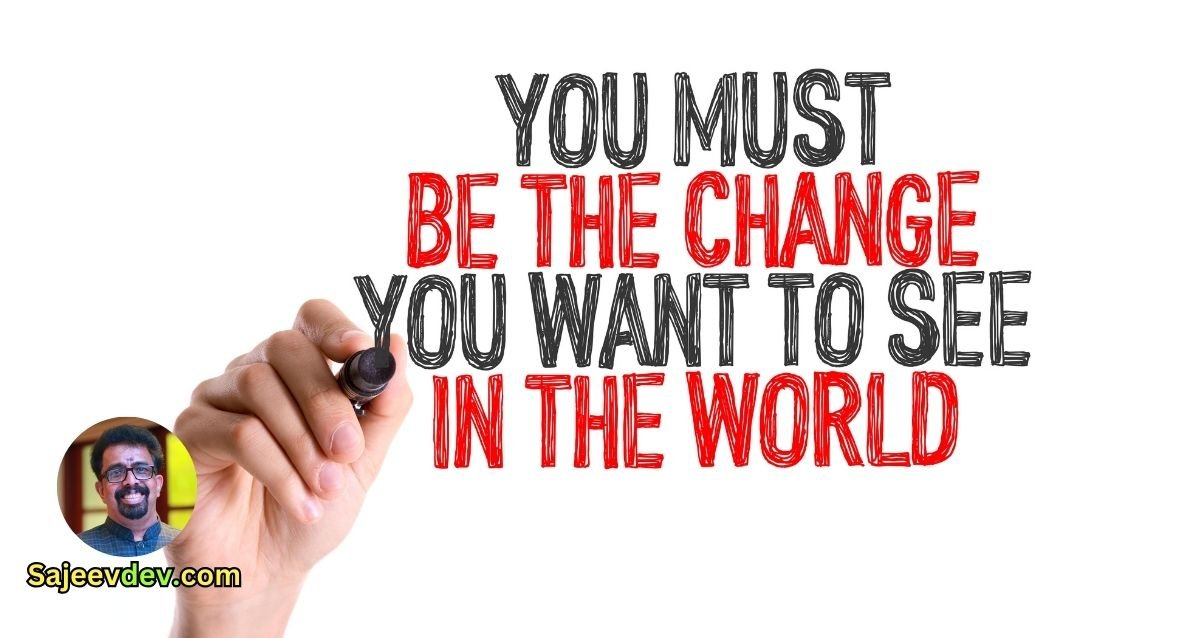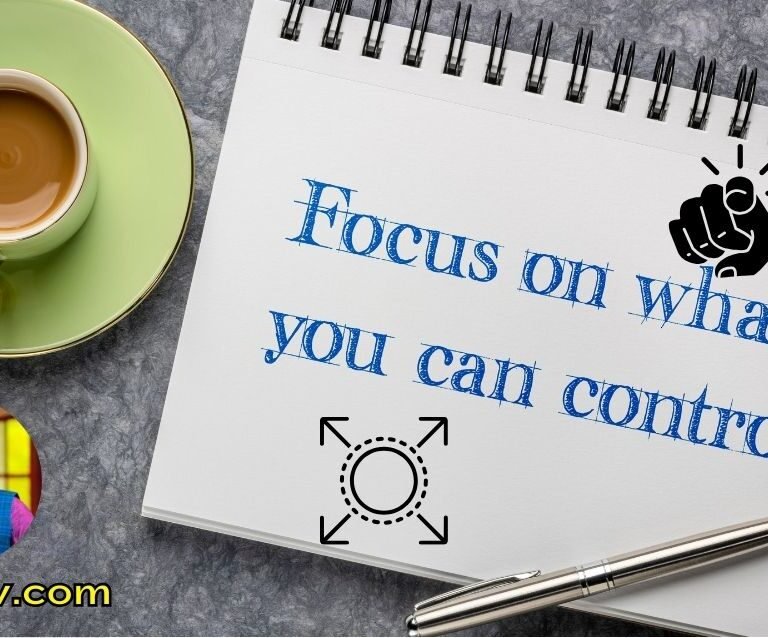The Power of Personal Change
The phrase “be the change that you wish to see in the world,” often attributed to Mahatma Gandhi, encapsulates a profound truth about the potential of individual action. While the authenticity of this attribution is debated, the essence of the message remains powerful: personal transformation is the cornerstone of broader societal change. Each person’s actions, choices, and behaviors contribute to the collective fabric of society, thereby influencing the world in ways both direct and subtle.
At its core, personal change involves a conscious effort to improve oneself—whether through developing new skills, adopting healthier habits, or nurturing a more compassionate mindset. These individual improvements do not occur in a vacuum; they create a ripple effect that extends beyond the self. For instance, when one person adopts sustainable living practices, it not only reduces their own ecological footprint but also encourages others to reconsider their environmental impact, fostering a community-wide shift towards sustainability.
The significance of personal change lies in its ability to inspire and motivate others. When individuals witness positive transformations in their peers, they are often prompted to reflect on their own lives and consider making changes. This domino effect can lead to a collective movement towards betterment, where communities evolve through the cumulative impact of individual efforts. In this way, personal change serves as the catalyst for social transformation, highlighting the interconnectedness of personal and communal growth.
Moreover, the commitment to personal change fosters a sense of empowerment. Recognizing that one’s actions can make a tangible difference cultivates a mindset of agency and responsibility. It underscores the notion that every individual has the power to contribute to societal progress, regardless of their background or circumstances. By embodying the change they wish to see, individuals not only enhance their own lives but also pave the way for a more harmonious and equitable world.
Understanding the Philosophy
The quote “Be the change that you wish to see in the world” is often attributed to Mahatma Gandhi, although there is no concrete evidence that he precisely phrased it this way. Nevertheless, the sentiment aligns closely with Gandhian philosophy, which emphasizes personal responsibility and the power of individual actions to effect broader social change. At its core, this philosophy challenges individuals to embody the principles they advocate for, rather than merely demanding them from others.
Gandhi’s concept of Satyagraha, or “truth force,” underscores the importance of personal integrity and nonviolent resistance in the struggle for justice. This idea extends beyond political activism to encompass everyday actions and attitudes. The philosophy suggests that true transformation starts within oneself, setting an example that inspires and influences others. By living the values they wish to see in the world, individuals can create a ripple effect, fostering a culture of empathy, accountability, and change.
Over time, this philosophy has been interpreted in various ways, often broadening its scope to include contemporary issues such as social justice and environmental sustainability. In today’s context, the idea of being the change resonates with movements like climate activism, where individuals and communities take proactive steps to mitigate environmental impact. Similarly, social justice movements advocate for systemic change by encouraging people to examine and alter their own prejudices and behaviors.
In contemporary society, the philosophy of being the change is not just about personal morality but also about collective responsibility. It encourages active citizenship and community engagement, urging people to contribute positively to their surroundings. By aligning personal actions with broader societal goals, individuals can help address complex challenges such as inequality, discrimination, and environmental degradation.
Thus, the philosophy encapsulates a timeless and universal truth: meaningful change begins with ourselves. It calls for a holistic approach where individual transformation is seen as a catalyst for societal progress, fostering a more just, equitable, and sustainable world.
Self-Reflection: A Starting Point
Embarking on a journey of personal and social transformation begins with self-reflection. This crucial step allows individuals to gain a deeper understanding of their values, strengths, and areas for improvement, serving as a foundation for meaningful change. By engaging in self-reflection, one can identify the intrinsic motivations that drive their actions and behaviors, paving the way for intentional growth.
One effective method for self-reflection is journaling. Writing down thoughts, experiences, and emotions can provide clarity and insight into one’s inner world. It allows for an honest assessment of past actions and decisions, highlighting patterns that may need to be addressed. Journaling also serves as a record of progress, enabling individuals to track their development over time.
Meditation is another powerful tool for self-reflection. By fostering a state of mindfulness, meditation helps individuals become more aware of their thoughts and feelings in the present moment. This heightened awareness can uncover subconscious beliefs and biases that influence behavior. Regular meditation practice can lead to a more balanced and centered approach to life, facilitating personal transformation.
Seeking feedback from others is equally important. Constructive criticism from trusted friends, family, or colleagues can provide valuable perspectives that one might overlook. This external input can reveal blind spots and offer new angles from which to view personal challenges. Engaging in open and honest dialogue with others encourages accountability and promotes a culture of continuous improvement.
Understanding one’s own values, strengths, and weaknesses is essential for initiating any form of change. This self-awareness forms the bedrock upon which personal and social transformation is built. By recognizing what truly matters, individuals can align their actions with their core principles, leading to a more authentic and fulfilling life.
Setting Personal Goals for Change
Setting personal goals is a fundamental step in driving both personal and social transformation. To ensure these goals are both achievable and meaningful, adopting the SMART criteria is essential. SMART stands for Specific, Measurable, Achievable, Relevant, and Time-bound. By following this framework, individuals can create well-defined objectives that contribute to broader societal issues.
Firstly, goals should be Specific. A specific goal clearly outlines what is to be achieved, eliminating ambiguity. For example, instead of setting a vague goal like “help the environment,” one might aim to “reduce plastic usage by 50% within six months.” This goal is clear and directly addresses a particular issue.
The second criterion is Measurable. A goal should have criteria for measuring progress. Measurable goals allow individuals to track their progress and stay motivated. In the context of reducing one’s carbon footprint, a measurable goal could be “to bike to work three times a week instead of driving.”
Next, goals must be Achievable. It’s important to set goals that are realistic and attainable. Setting an unrealistic goal can lead to frustration and failure. For instance, aiming to volunteer 20 hours a week might be impractical for someone with a full-time job. Instead, a more achievable goal could be “volunteer 5 hours a month at a local food bank.”
Goals should also be Relevant. This means the goal should align with one’s broader values and long-term objectives. A relevant goal for someone passionate about social justice might be “to participate in monthly community clean-up events to promote neighborhood well-being.”
Lastly, a goal should be Time-bound. Setting a deadline creates a sense of urgency and helps in prioritizing tasks. An example would be “to reduce household energy consumption by 20% within the next year,” providing a clear timeframe for achieving the goal.
By setting SMART goals, individuals can not only foster personal growth but also contribute positively to societal changes. Whether it’s reducing carbon footprints, engaging in community service, or promoting social justice, well-defined personal goals can lead to significant, collective impact.
Taking Action: Small Steps Lead to Big Changes
In the journey toward personal and social transformation, the importance of taking actionable steps, no matter how small, cannot be overstated. While grand gestures often capture the spotlight, it is the accumulation of small, consistent actions that truly drive substantial change. This principle is exemplified in numerous real-life scenarios where individuals have made significant impacts through seemingly modest efforts.
Consider the case of Malala Yousafzai, who began advocating for girls’ education in her hometown of Mingora, Pakistan. Her initial efforts were as simple as writing a blog under a pseudonym, yet her persistent advocacy eventually garnered global attention, leading to her becoming the youngest-ever Nobel Prize laureate. Similarly, environmentalist Greta Thunberg started her campaign by skipping school to protest outside the Swedish Parliament. This single act of defiance has since sparked a worldwide movement for climate action, illustrating how small steps can lead to monumental changes.
Maintaining motivation in the face of challenges is crucial for sustained progress. One effective strategy is to set clear, achievable goals. Breaking down larger objectives into smaller, manageable tasks can make the process less overwhelming and more attainable. Additionally, keeping a record of accomplishments, no matter how minor, can provide a sense of progress and boost morale. Celebrating these small victories fosters a positive mindset and reinforces the value of incremental progress.
Overcoming obstacles often requires a blend of resilience and adaptability. Developing a support network can be invaluable, as it provides encouragement and practical advice during tough times. Moreover, embracing a growth mindset helps in viewing setbacks as opportunities for learning and improvement rather than insurmountable barriers. Persistence, coupled with the ability to adapt to changing circumstances, is key to navigating the inevitable challenges that arise on the path to meaningful change.
Ultimately, the power of small actions lies in their cumulative effect. Each step, no matter how insignificant it may seem, contributes to the larger goal of personal and social transformation. By taking consistent action, maintaining motivation, and overcoming obstacles, individuals can indeed be the change they wish to see in the world.
The Role of Community and Collaboration
Community engagement and collaboration play pivotal roles in amplifying individual efforts toward personal and social transformation. By working collectively, individuals can create a more significant impact than by acting alone. Building supportive networks and participating in collective actions enable people to leverage the strengths, resources, and diverse perspectives of a group, fostering a sense of belonging and shared purpose.
One of the most compelling examples of successful community initiatives is the rise of grassroots movements. These movements often begin with a few dedicated individuals and grow into powerful forces for change through the involvement of the broader community. For instance, the global environmental movement Fridays for Future, initiated by climate activist Greta Thunberg, demonstrates how individual actions can inspire large-scale participation and drive policy changes. Similarly, local community gardens have become popular worldwide, promoting sustainable living and providing fresh produce while fostering community spirit and cooperation.
Building supportive networks is essential for personal and social transformation. These networks can take various forms, such as neighborhood groups, online communities, or professional organizations. By connecting with like-minded individuals, people can share knowledge, resources, and support, which can be crucial for overcoming challenges and achieving common goals. For example, mutual aid groups have become increasingly important, especially during crises, by providing immediate assistance and creating long-term support systems.
Participation in collective actions is another way to contribute to positive change. Collective actions can range from local clean-up drives to global advocacy campaigns. Engaging in these activities not only helps address specific issues but also empowers individuals by making them feel part of a larger movement. To get involved in local or global movements, readers can start by identifying causes they are passionate about, researching existing initiatives, and reaching out to join or collaborate with these groups.
Ultimately, the synergy created through community engagement and collaboration can lead to more effective and sustainable outcomes. By working together, individuals can harness the power of collective action to drive meaningful and lasting change in their communities and beyond.
Measuring Impact and Adjusting Goals
To truly embody the principle of “Be the change that you wish to see in the world,” it is essential to measure the impact of your actions. Assessing progress ensures that efforts are effective and meaningful. Various methods can be employed to track advancement, each with its unique benefits and applications.
One effective approach is maintaining a progress journal. This traditional yet powerful tool allows for regular reflection on personal and social goals. Documenting daily or weekly achievements can provide clarity and motivation, helping to identify what strategies are working and what may need adjustment. Additionally, a progress journal offers a tangible record of growth, which can be particularly rewarding over time.
In the digital age, numerous tools are available to facilitate the measurement of impact. Applications and software designed for goal tracking can offer a more structured and analytical approach. These tools often provide features such as progress visualization, reminders, and data analytics, which can help in making informed decisions. Examples include habit-tracking apps, project management software, and social impact platforms that allow for detailed monitoring and reporting.
Flexibility in adjusting goals is equally crucial. As feedback and results are gathered, it is important to remain adaptable. Goals should not be rigid; they need to evolve based on new information and changing circumstances. Being open to adjustments ensures that efforts remain aligned with the desired outcomes and can adapt to any unforeseen challenges or opportunities.
Feedback loops, whether from personal reflections, peer reviews, or community input, play a significant role in this process. Constructive feedback provides valuable insights that can inform necessary changes and improve effectiveness. Embracing a mindset of continuous improvement allows for the refinement of strategies, ensuring that actions remain impactful and aligned with broader objectives.
By consistently measuring impact and being willing to adjust goals, one can ensure that their efforts to be the change they wish to see in the world are both effective and sustainable. This dynamic approach not only enhances personal growth but also amplifies the positive influence on society.
The Ongoing Journey of Change
Throughout this guide, we have explored the multifaceted nature of personal and social transformation. The essence of being the change you wish to see in the world lies in understanding that change is a continuous journey, not a one-time effort. Each section has highlighted the importance of self-awareness, purposeful action, and community involvement as critical elements in fostering positive change. By embracing these principles, individuals cultivate a mindset geared towards ongoing improvement and collective betterment.
Self-awareness serves as the foundation for any meaningful change. By reflecting on our values, beliefs, and behaviors, we can identify areas for growth and development. This introspective process is vital for personal transformation as it helps us set clear, actionable goals aligned with our vision of a better world. Furthermore, purposeful action transforms these goals into tangible outcomes. By committing to small, consistent steps, we can make significant progress over time, demonstrating that even the smallest actions can have a profound impact.
Community involvement amplifies our individual efforts, creating a ripple effect that extends beyond our immediate surroundings. Engaging with others who share our vision fosters a sense of collective responsibility and solidarity. Whether through volunteer work, advocacy, or simply supporting local initiatives, our contributions help build stronger, more resilient communities. The synergy created through collaboration enhances our capacity to address complex social issues, making collective progress more attainable.
In conclusion, being the change you wish to see in the world is an ongoing journey that requires dedication, perseverance, and a genuine commitment to self and societal betterment. Every action, no matter how small, contributes to a larger movement for positive change. By continuously seeking ways to improve ourselves and our communities, we embody the transformative power of individual and collective effort. Remember, the journey of change is never-ending, but each step taken brings us closer to the world we aspire to create.









